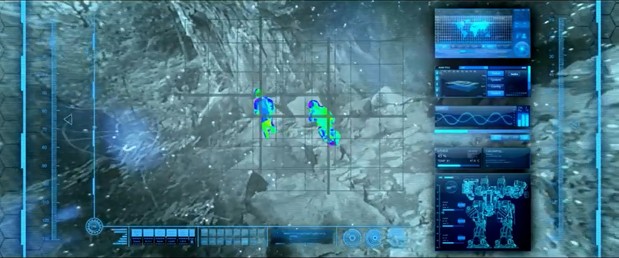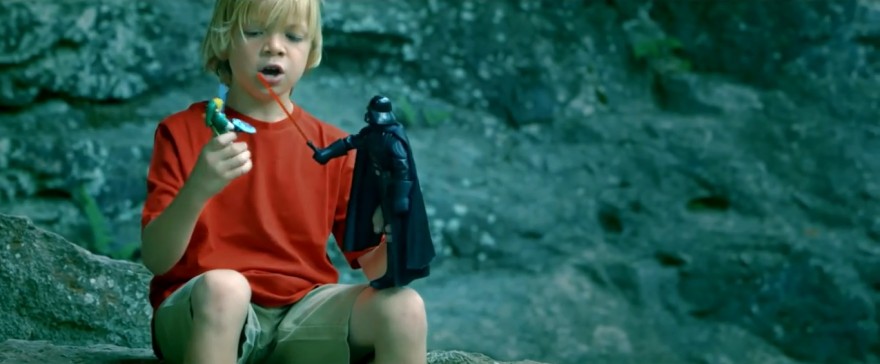James Wilkes wears his heart on his shelf. He used his arms to describe how big his Dark Link statue is, and noted it’s accompanied by a likewise huge StarCraft figurine, as well as a phalanx of lesser GI Joe, He-Man and Masters of the Universe toys. Toys are a big part of Wilkes’ life, but they’re decorative. Like most grown-up children, he hasn’t actually played with any for some time.
“I’m not sitting around with action figures going pchew pchew pchew,” he says. “Grade six was probably the end of it, when playing with toys wasn’t cool anymore.”
But just because he isn’t still sitting around on his bedroom floor doesn’t mean he hasn’t found another space to do so. His short film Young Wonder, which debuted at the Toronto International Film Festival, is a juvenile joyride through playtime. It begins and ends with piles of playthings, elephant boneyards of all the passions in his life: Mario, Dr. Who, Devil Dinosaur, Battle-Cat, and so on.
It stars two young boys darting through the forest, driven forward by tentacle enemies, mech warriors and the tantalizing promise of snacks. Wilkes harvested the earnest, untranslatable behaviors of kids from time spent working on reality shows like Pick a Puppy, and most of the dialogue was improvised. The sequence where one of the boys gets shot in the nuts was lifted directly from their audition, during which the two boys played videogames and one threw a controller at the other’s crotch for no apparent reason.
“I think this film is very much what it is: about play,” says Wilkes. “There’s play, there’s exploding, there’s dick jokes and kids having fun. I think play is something we lose as we grow older. I think videogames in a lot of ways are continuing play.”
It is odd to think that there is an ability lost amidst all the ones we gain. Years ago, when I cleaned out my old room, reboxing mounds of action figures, I laid belly down on my bed to see what sort of adventure I could toss the plastic warriors into. I came up with nothing.

The ability to extend imagination into molded objects felt shot, like something was busted. This was strange given that it remained easy for me to imagine narrative fantasies in other contexts: novels, videogames, tabletop roleplay. Wilkes can talk endlessly about his toys and the fun he had accumulating his collection, even though he doesn’t play with them. But he’s got a pretty good replacement.
“When Call of Duty comes out I’m going to take four days off,” he says. “Grand Theft Auto, man, hoooly shit.”
Wilkes estimates that he plays video games at least an hour a day, but averages closer to three. He’s less interested in those that just escort you from plot point to plot point, such as The Last of Us or Heavy Rain, and more into something like StarCraft (which he talked about more often than his own film) or Skyrim. These games, like toys or comic books, require the player to have some imaginative glue, to piece stories together between the panels.
“Most videogames connect everything,” says Wilkes. “You don’t have to do that thinking every time something happens. That space between things. That’s what my movie’s about.”

Engaging in nostalgia has become a generational hobby, and it’s expressed through thrift store action figures and post-Toy Story 3 remorse. Kids today are actually growing up with video games, but Wilkes takes comfort that, while his older nephews show more interest in iPads than inanimate objects, the younger ones mirror his tastes. Recent mega-successful games like Skylanders and Disney Infinity even attempt to marry the two.
“I wanted to make something that was nostalgic,” he says. “People think I have to say big things. Entertainment can just be entertaining. I think my film is entertaining, but it’s mostly a wink and a nod to my and our collective cultural past. All the things I love and a lot of the things people love.”
Wilkes doesn’t have to play with the toys; he’s found other ways. He’s made a film with them, and he wasn’t shy to say he’d love to make a superhero film akin to Kick-Ass or Chronicle. You can still play with toys without playing with toys, in other words. Leaving Vader on your shelf doesn’t mean you don’t love him.
